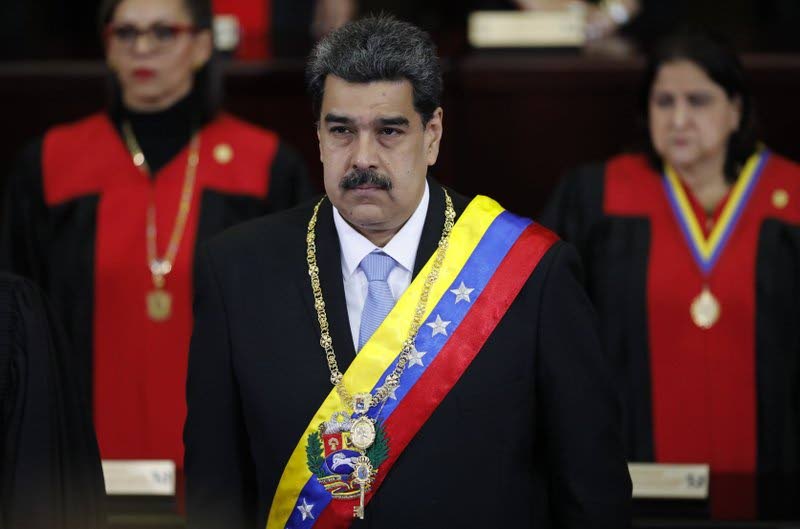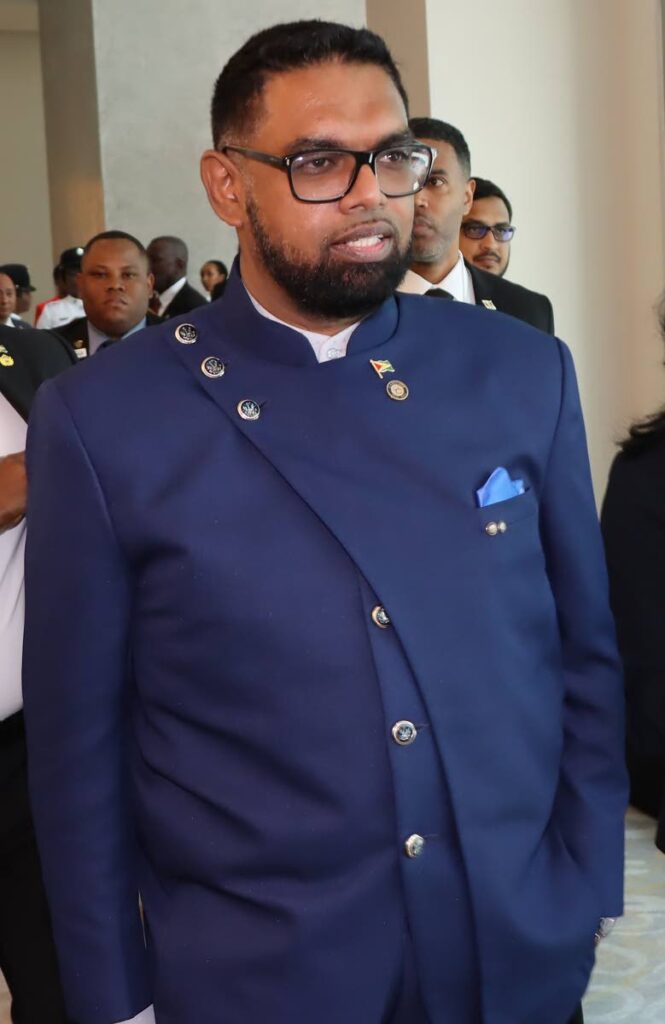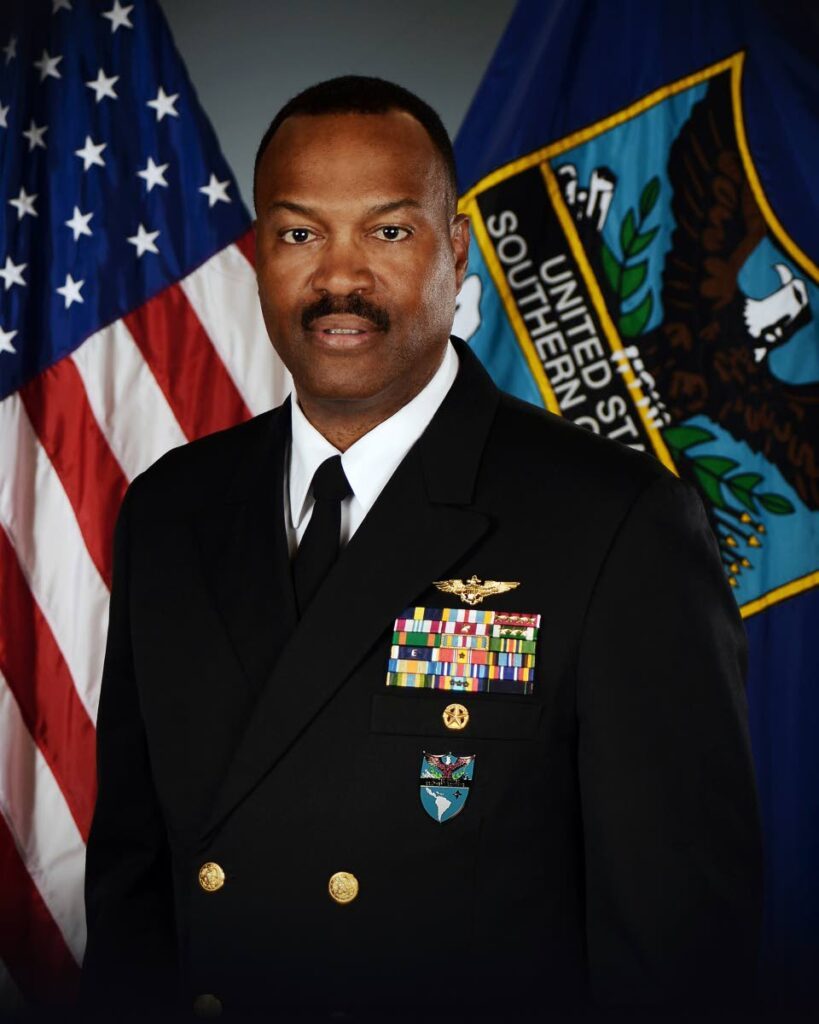Caricom tells Venezuela: Hands off Guyana

IN a strong yet diplomatically-worded statement, Caricom on Wednesday told Venezuela to reject the use of force in its territory dispute with Guyana, but rather to let it be decided by the International Court of Justice (ICJ). Newsday tried to contact Foreign Affairs Minister Dr Amery Browne who opted not to comment.
The decades-long dispute, which emerged in 1962 after Venezuela said it would no longer heed an 1899 arbitration award, has been reignited by a December 3 Venezuelan referendum on the population' views on Venezuela's claim to the oil-rich and mineral-rich Essequibo region which is 160,000 square kilometres and constitutes two-thirds of Guyana.
The statement came days after the US gave its nod to TT to pay Venezuela in currency for gas from the Dragon field being developed by Shell and PDVSA under an amended licence until October 31, 2025 granted by the US Treasury Department Office of Foreign Assets Control (OFAC).
Caricom noted the Venezuelan National Assembly's decision to hold a referendum on defending Venezuela’s claim of the Essequibo.
The statement said if the referendum drew an affirmative reply to two questions, that would authorise the Venezuelan Government to "embark on the annexation of territory, which constitutes part of Guyana," and to create a state within an enlarged Venezuela to be known as Guyana Essequibo.
"Caricom reaffirms that international law strictly prohibits the government of one state from unilaterally seizing, annexing or incorporating the territory of another state."
An affirmative vote would "open the door to the possible violation of this fundamental tenet of international law," it added.
The statement said the land and water in question – the Essequibo Region of Guyana – comprises more than two-thirds of Guyana.

"Caricom notes that the language of two questions approved to be posed in the referendum seeks an affirmation and implementation of Venezuela’s stance on the issue 'by all means, according to/with the law.'
"It is open to reasonable persons to conclude that 'by all means', includes means of force or war.
"Caricom earnestly hopes that Venezuela is not raising the prospect of using force or military means to get its own way in this controversy over territory."
The statement recalled the long-standing position of Latin American and Caribbean counties, including Venezuela, that this region must remain a zone of peace.
"Meanwhile, Caricom insists that the referendum proposed by Venezuela has no validity, bearing, or standing in international law in relation to this controversy.
"The referendum is a purely domestic construct, but its summary effect is likely to undermine peace, tranquillity, security, and more, in our region.
Caricom reiterated its support for the judicial process and hoped Venezuela will engage fully in that process before the ICJ which has determined that it has the jurisdiction in the case brought before it to determine the validity of the 1899 Arbitral Award which Venezuela questions.
"The court’s final decision will ensure a resolution that is peaceful, equitable and in accordance with international law."
The matter was taken to the ICJ in 2018 and last April the ICJ ruled it did have the authority to adjudicate despite Venezuela's objection.
The Caricom statement came after a diplomatic tit-for-tat between the two disputants – Guyana, a new energy powerhouse, and Venezuela, whose energy-based economy has been crippled by US sanctions following questions about the fairness of its last presidential election.
The Venezuelan Government, in a communiqué on Wednesday, strongly objected to a joint statement earlier by Guyanese President Dr Mohammed Irfaan Ali and Guyana Opposition Leader Aubrey C Norton. The Venezuelans alleged Guyanese interference in Venezuelan matters, namely the referendum.
The communiqué accused Ali of repeatedly refusing to attend talks with Venezuela.

Alluding to Guyana's award of exploration blocks to oil/gas companies, the Venezuelans accused Ali of persisting in his "illegal, abusive and arbitrary conduction of disposing of a territorial sea still pending delimitation."
The Venezuelan statement said, "This behaviour threatens the stability of the region, fed by Guyana's stubborn association with the interests of the US Southern Command." It said the referendum was rooted in a "full exercise of Bolivarian democracy."
The statement said the referendum would take place in line with the law and would be done to guide public bodies and defend constitutional and legal principles.
The Venezuelan Government urged the Guyanese leadership to "dissociate itself from the interests of the Exxon Mobil transnational corporation and the US Southern Command," but instead to sit at the negotiating table under the Geneva Agreement towards a practical and satisfactory solution for the parties.
Ali and Norton in a statement earlier said all Guyanese people agreed their country's sovereignty was paramount and decried the referendum as the Venezuela Government's latest action "in pursuit of its spurious claim to the Essequibo."
It said, "To this end, they condemned the flagrant violation of the rule of law by Venezuela and agreed that no effort should be spared to resist that country’s persistent endeavours to undermine Guyana’s sovereignty and territorial integrity."
Ali and Norton said Guyana's territorial integrity and sovereignty must be subserved by "a vigorous and comprehensive public relations programme and a proactive and robust diplomatic effort" against Venezuelan propaganda and misinformation on the territorial controversy generally, and the Geneva Agreement in particular.
The 1966 Geneva Agreement was signed by Guyana and Venezuela and outlined steps to resolve the dispute.
The statement said the two Guyanese leaders backed the judicial process under way at the ICJ, to resolve Venezuela's query of the validity of the 1899 Arbitral Award.
It said for six decades since 1899, Venezuela treated the award as a final settlement of the border between the two countries.
To this end, Venezuela had consistently recognised, affirmed and relied upon the 1899 Arbitral Award as “a full, perfect, and final settlement” of the boundary between the former British Guiana and Venezuela.
"Venezuela proceeded to formally ratify the demarcated boundary in its domestic law and thereafter published official maps, which depicted the boundary following the line described in the 1899 Award."
For more than 60 years, Venezuela gave full effect to that award, and never raised a concern as to its validity and binding legal effects, including in 1931 recognising the the tri-junction point of the boundaries of British Guiana, Venezuela and Brazil as described in the 1899 award.
The statement said Ali and Norton said the referendum questions "violated the sanctity of treaties and blatantly disregarded the principles of international law."
They said one referendum question claimed a “historical position” of Venezuela not recognising the ICJ's jurisdiction to resolve the territorial controversy. Another question seeks the approval of the Venezuelan people to create a new Venezuelan state consisting of Guyana’s Essequibo Region, to include “the granting of citizenship and Venezuelan identity card.”
In claiming this could be done under the Geneva Agreement, Venezuela had misrepresented international laws, the statement said.
"They further underscored the fact that no Government or the people of one country has the right in international law to seize, annex or conquer the territory of another country. International law emphatically prohibits this.
"They acknowledged the support by the international community for the preservation of Guyana’s sovereignty and territorial integrity and urged that Venezuela’s actions be closely monitored as they pose a serious threat to the peace and security of the hemisphere.
"President Ali and Opposition Leader Mr Norton agreed to keep in close consultation on this matter of national importance."
On Monday, US Southern Command Deputy Vice Admiral Alvin Holsey and US Ambassador Candace Bond met with Prime Minister Dr Keith Rowley, Minister of Foreign Affairs Dr Amery Browne and National Security Minister Fitzgerald Hinds to discuss continued security co-operation between the US and TT.
On Wednesday, Holsey and Bond presented a US$1 million field hospital and ambulance to the Tobago House of Assembly (THA).


Comments
"Caricom tells Venezuela: Hands off Guyana"